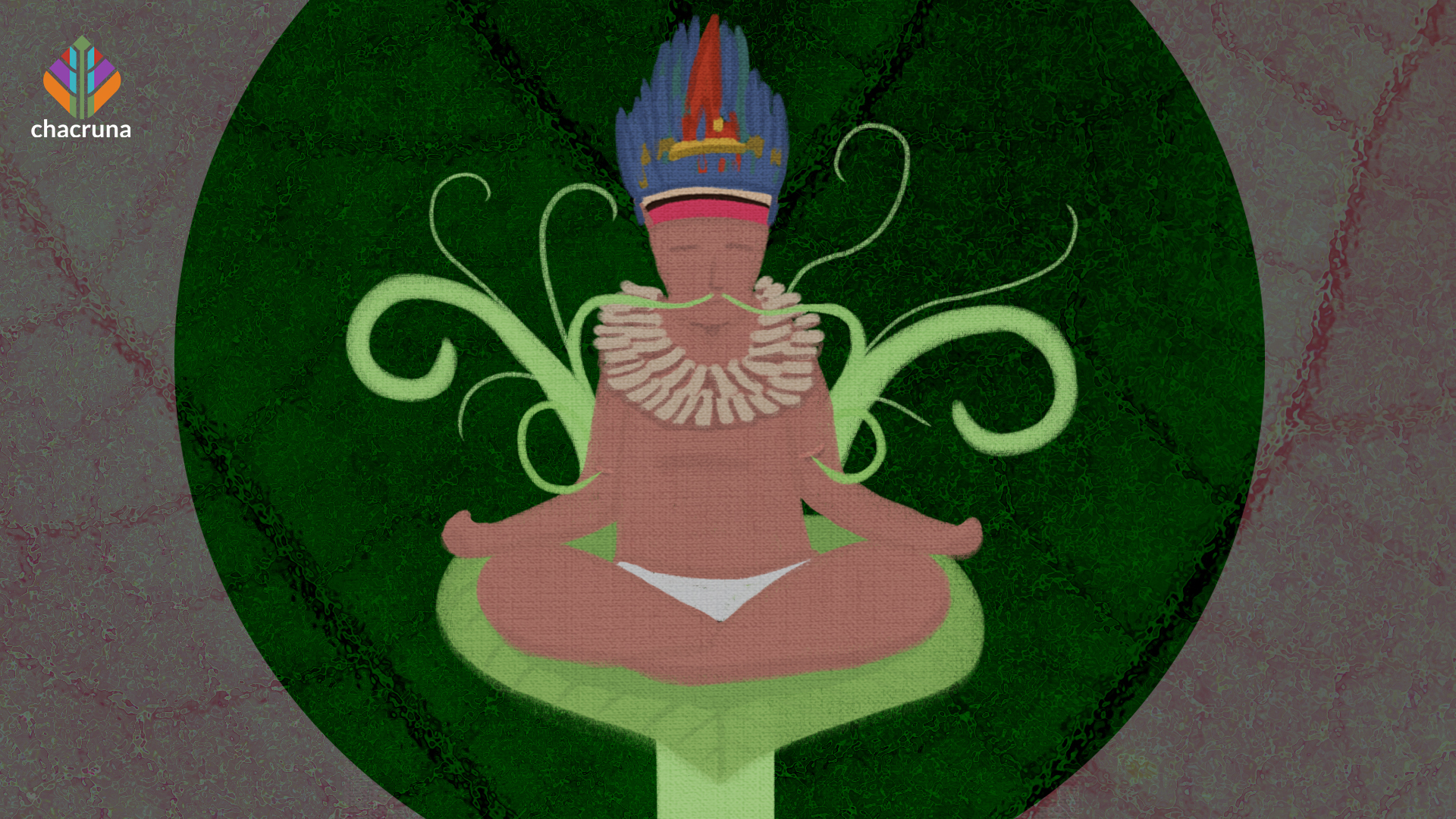- How Colombian Yagé Communities Confronted the COVID-19 Pandemic - March 1, 2021
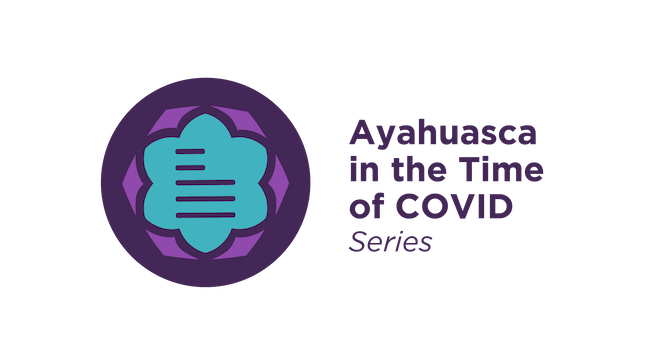
The burgeoning expansion of ayahuasca around the globe has allowed for the evolution of an infinitely diverse array of ayahuasca practices and communities, spanning from Indigenous groups in the Amazon Basin and traditional ayahuasca churches in Brazil to newly evolving neoshamanic traditions in North America, Europe, and beyond. This series will examine how the practices and traditions of these diverse communities are evolving to meet the challenges that have emerged as a result of the global pandemic and the measures taken to mitigate its impact.
“We should not fear the virus. But it’s still here, and we have to treat it with respect,” explained shamanic healer, Alex Rojas Mutumbajoy, as we sipped on a hot cup of aguapanela on a Sunday morning in late November. It was the morning after the second private Yagé ceremony to take place in Alex’s maloka, located on the outskirts of Medellín, after the lockdown.
Mutumbajoy, originally from the department (a grouping of municipalities) of Putumayo, is one of many taitas (healers) who were forced to put the brakes on much of their healing activity when COVID-19 arrived. Colombia’s six-months-long quarantine meant that many shamanic healers were unable to hold group ceremonies outside of the Amazonian region. And, as the pandemic unraveled, many of their communities, often located in remote areas in the Colombian Amazon, felt the hard hit of the virus in their territories.
While Colombia may not boast the scale of ayahuasca tourism seen in Peru, the COVID-19 pandemic has still delivered a decisive blow to Yagé ceremonies, along with the peoples and regions from which these practices descend. Yet, despite the pandemic’s physical, economic, and psychological impact on these communities, I uncovered numerous stories of Indigenous resilience and adaptability, alongside ongoing trust and commitment to using plant medicines. This ancestral knowledge, in fact, emerged as a key tool within the community response to COVID-19.
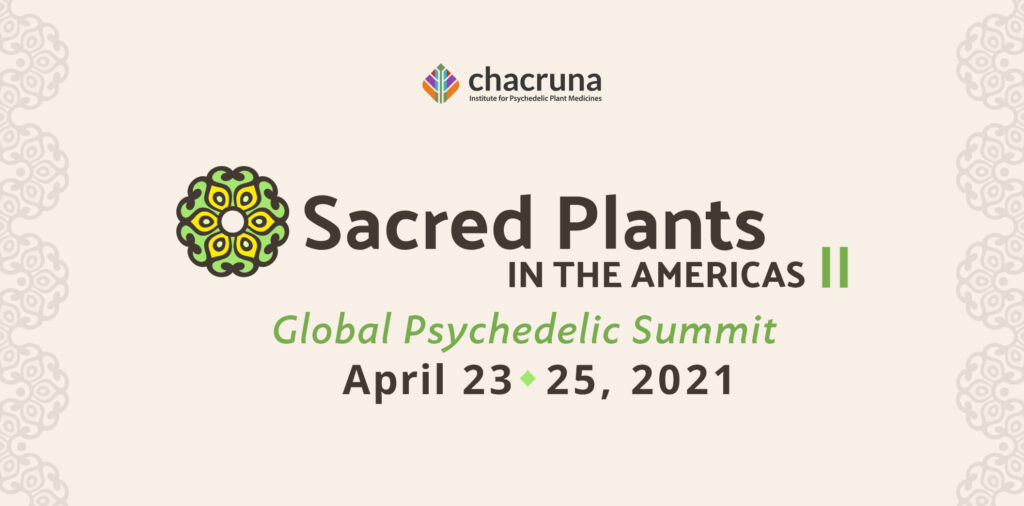
Join us at Sacred Plants in the Americas II
COVID-19 Impact in the Colombian Amazon: Unprepared and Underequipped
Undoubtedly, the department of Amazonas was the hardest and fastest hit by the virus, with the first case being reported there on April 17. With an average of more than 75% of people living below the poverty line outside of the capital, Leticia (where the number is 48.4%) represents one of the most vulnerable areas of the country.
By late March, numerous Indigenous associations were already proposing a list of strict measures to stop widespread infiltration of the virus into their communities, including stopping anyone traveling into the region that didn’t originate from there. The NGO Fundación Gaia Amazonas stressed the lack of infrastructure in the department of Amazonas, which, at the time, had only 68 hospital beds, 58 of which were in Leticia and, crucially, no intensive care units.
Indigenous groups in the department of Caquetá also released an official declaration, insisting that the national government provide humanitarian support to prevent the entry of coronavirus—and that their most renowned taitas and spiritual doctors should form part of the medical team protecting communities.
Indigenous groups in the department of Caquetá also released an official declaration, insisting that the national government provide humanitarian support to prevent the entry of coronavirus—and that their most renowned taitas and spiritual doctors should form part of the medical team protecting communities.
On May 19 2020, OPIAC (Organización Nacional de los Pueblos Indígenas de la Amazonía Colombiana) published an official declaration demanding government support for the whole Amazonian region, which had been vastly underfunded and unprepared to be able to contain the spread of the virus.
Despite these pleas, COVID-19 has had a devastating impact in the Colombian Amazon, with a mortality rate of 4.93% in Amazonas’ Indigenous population, compared to the national average of 3.2%. Other Amazonian departments saw a real rise in cases later on in the year, including Putumayo, Guainía, Guaviare, Caquetá, and Vaupés. Notably, 80% of cases across the whole Colombian Amazonian region occurred in the final quarter of 2020.
With so much of the culture, traditions, and knowledge passed down orally from these older generations, the deaths of so many elders at the hands of COVID-19 delivered a decisive blow to those communities.
It’s also vital to note, in particular, the loss of Indigenous elders and leaders in the Colombian Amazon. With so much of the culture, traditions, and knowledge passed down orally from these older generations, the deaths of so many elders at the hands of COVID-19 delivered a decisive blow to those communities. As of December 2020, it was estimated that the virus affected more than 50 Amazonian communities and caused the death of over 100 Indigenous people, 100 of whom were over the age of 50, and 43 of whom were over the age of 75. According to Fundación Gaia Amazonas, this represented “the loss of invaluable knowledge for every affected Indigenous community.”
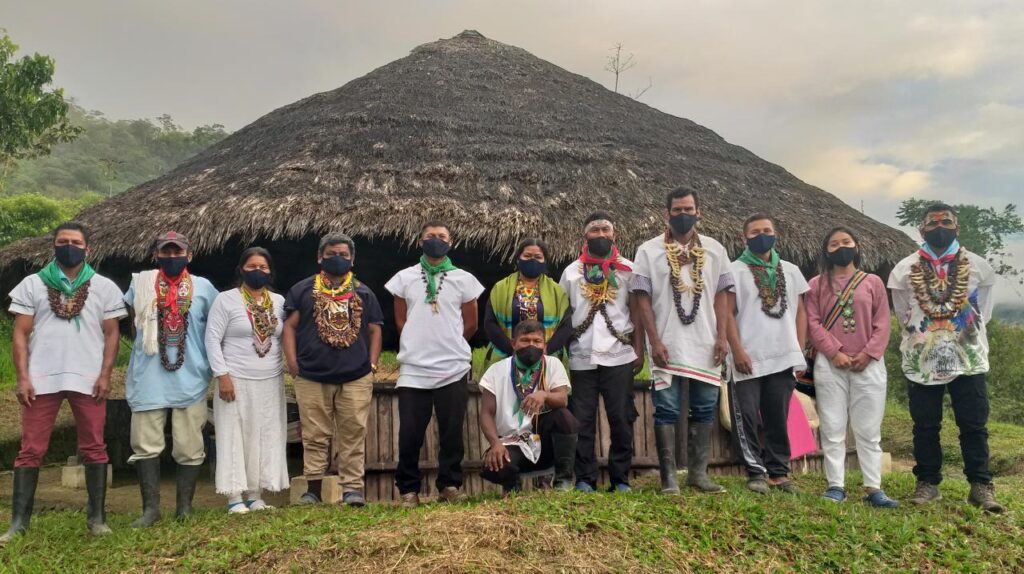
COVID-19 Delivered an Unexpected Blow
Behind these figures are countless stories of Indigenous communities fighting to survive not only the health implications of the virus, but also the economic, psychological, and spiritual impact of continued quarantine measures. “We basically had zero income for months on end,” explained Henrri Muchavisoy. Muchavisoy is a taita from Resguardo Inga de Yunguillo in Putumayo, who travels periodically to conduct Yagé ceremonies in other areas of Colombia.
“It’s been difficult to try to manage all of the monthly outgoings and bills, and stay on top of credit and debt repayments. We’ve had to put family projects on hold,” said Muchavisoy. He explained that his village doesn’t have the economic infrastructure for people to be able to make enough money and there aren’t any big companies or projects for people to work on. Unable to hold ceremonies in other areas of Colombia, Muchavisoy could not generate the same income as pre-pandemic times, and government help was extremely limited.
The threat to Indigenous households comes not only in the form of an economic blow, but insufficient public health resources also put people at disproportionate risk of harm by COVID-19.
Jhon Moreno is a human rights lawyer and a specialist in environmental management and Indigenous justice. He is Indigenous Kotiria, from the department of Vaupés. Moreno emphasized the precarious nature of the health system in these areas, especially deeper parts of the Amazon. “The pandemic has laid bare the lack of not only medical infrastructure and resources in the Amazonian region in Colombia, but also the lack of qualified personnel,” he explained.
While countless Indigenous groups have made demands for more support from national and local governments, those requests have been left unanswered.
“While countless Indigenous groups have made demands for more support from national and local governments, those requests have been left unanswered. The authorities say that they have the political will, but not the resources necessary, to meet the needs of this region during the pandemic.”
Stories of Resilience and the Power of Plant Medicines
Largely deprived of access to a modern health system and state support, these communities have instead turned to a source of hope and resilience in the fight against the pandemic: Traditional plant medicine. Moreno explained that he hears countless stories of the use of plant medicines together with traditional songs and music to protect from the worst effects of COVID-19. “Something I’ve heard time and time again across the region, is that it’s thanks to plant medicines that the number of cases and deaths isn’t far higher,” he said.
Rosendo Ahué is the health advisor (encompassing both traditional and Western medicine) to ONIC (Organización Nacional Indígena de Colombia), and is Indigenous Tikuna, from the department of Amazonas. Ahué explained how COVID-19 has made many Amazonian communities look to their pasts to uncover the “spiritual armor” necessary to confront the pandemic.
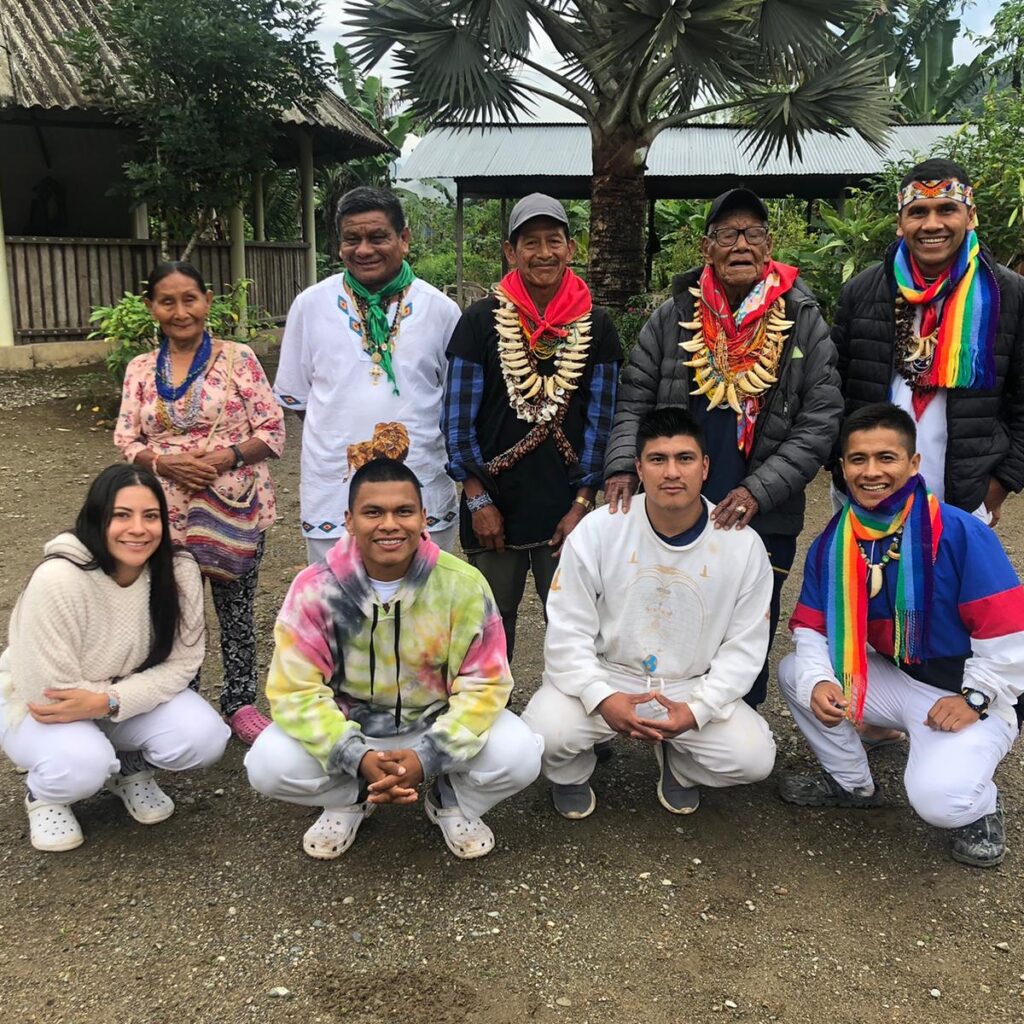
“We have to put more value and importance on our ancestral knowledge and use our own methods and practices that have been passed down from our ancestors to protect ourselves, our elders, our communities, and our territories,” he said. “While the pandemic has had a negative impact, it’s had a positive one too. We have been able to strengthen internally and spiritually to confront the situation.”
Yagé plays a key role in this act of strengthening and empowerment, and is helping many communities forge resilience during these times. “Yagé is a core part of tradition and culture in my village,” explained Alex Rojas Mutumbajoy. In fact, yagé is not only being used for its own healing power, but as a tool for people in Mutumbajoy’s community to identify other plant medicines that could act as vacunas naturales (natural vaccines): a preventative measure against the worst effects of the virus.
Henrri Muchavisoy also stressed the importance of yagé in not only physically demanding times, but mentally challenging ones too: “Yagé has been crucial for us to be able to strengthen our faith and stay psychologically motivated. People always get scared by the topic of death. Yagé helps them with this and reinforces their connection with God, with plant medicines, and with mother nature.”
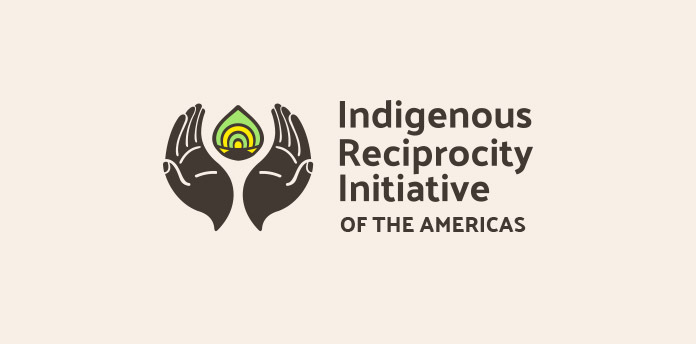
Discover Indigenous Reciprocity Iniciative of the Americas
that the usual transmission of this ancestral knowledge on the part of the elders, which is done through word and song, has become more complicated in the face of the virus.
Looking ahead, Muchavisoy would like to see economic resources provided to the sabedores and sabedoras (“knowledgeable ones”) of the community so they can use their ancestral knowledge to prepare these plant medicines for those who need them. However, Moreno added that “the usual transmission of this ancestral knowledge on the part of the elders, which is done through word and song, has become more complicated in the face of the virus. Many of them have refrained from gathering in large groups to share their knowledge.”
A Different Kind of Yagé Ceremony
In the Amazonian region, the extent to which local people stuck to traditional rituals around drinking yagé varied from community to community. “Some communities stopped doing group ceremonies out of fear, while others continued, but with new biosecurity protocols,” explained Rosendo Ahué.
Outside of the Amazon, it’s common to find frequent yagé ceremonies and retreats taking place around Colombian cities, including Bogotá, Medellín, and Popayán. Having had the chance to take part in a few close to Medellín over the last year or so, I got back in touch with some local facilitators to see how they’d fared over the course of the quarantine, and once restrictions were relaxed.
Daniela Villa and Keenan Lee are the founders of La Ceiba, a retreat center located in Girardota, around 45 minutes outside of Medellín. Villa explained that, even though they weren’t able to host ceremonies from mid-March until October, they were able to use that time to grow and connect in other ways. They used other plant medicines including mambe, ambil, and rapé, and benefited from practices of music, dance, yoga, and meditation.
When it came to reopening, La Ceiba could no longer host public ceremonies—that, in the past, would sometimes attract upwards of 80 participants. Instead, they have been holding private ceremonies and retreats with a maximum of 15 people. Guests are required to fill out a digital questionnaire beforehand, and upon arrival, must have their temperature taken and hands disinfected. During the ceremony itself, each person drinks from their own personal cup, and social distancing is practiced between everyone’s mats.
Ivaylo Govedarov, a plant medicine ceremony facilitator, breathwork instructor, and life coach, facilitated several yagé ceremonies local to Medellín in November and December of last year. “Before the pandemic, you would see lots of hugging and touching pre- and post-ceremony; this has now been toned down,” he explained.
Even for those who have dealt with the pandemic well—all things considered—it’s been a lot to process. There’s been a lot of energetic build-up, and yagé helps you get that energy moving, get out of your head, and connect with your heart.
When asked if people’s intentions for healing with yagé had changed from before COVID-19 was a concern, Govedarov identified heightened stress levels, but also a bigger desire for healing and expansion among the participants he worked with. “Even for those who have dealt with the pandemic well—all things considered—it’s been a lot to process. There’s been a lot of energetic build-up, and yagé helps you get that energy moving, get out of your head, and connect with your heart.”
Sign up to our Newsletter:
Ancestral Knowledge Must be Preserved and Supported
Perhaps the strongest message apparent in the stories of these communities is that due respect must be given to ancestral knowledge, traditions, and uses of plant medicines and their power when confronting the crisis of the pandemic. This means not only working towards developing this knowledge within Indigenous communities themselves, but cooperation and respect for traditional and sacred medicines on the part of the state apparatus too.
Amazonian communities all across the Colombian Amazon and elsewhere in Colombia demonstrated rigor, resilience, and adaptability in their fight against COVID-19. By connecting with their own ancestral practices, uniting together, and adapting to this new reality, these communities have become even stronger in the face of the pandemic.
Art by Mariom Luna.
References
Ambientalistas piden al gobierno acciones prioritarias para enfrentar pandemia en la Amazonia [Environmentalists ask the government for priority actions to face a pandemic in the Amazon]. (2020, April 28). Sostenibilidad Semana. https://sostenibilidad.semana.com/actualidad/articulo/coronavirus-en-colombia-piden-al-gobierno-acciones-prioritarias-para-enfrentar-pandemia-en-la-amazonia/50367
Colombia: Impacto humanitario por la COVID-19 en la triple frontera de Amazonas (Colombia, Brasil, Perú) Informe de Situación No. 01 (04/10/2020) – Colombia [Colombia: Humanitarian impact of COVID-19 in the triple border of Amazonas (Colombia, Brazil, Peru) Situation Report No. 01 (10/04/2020) – Colombia]. (2020, October 4). ReliefWeb. https://reliefweb.int/report/colombia/colombia-impacto-humanitario-por-la-covid-19-en-la-triple-frontera-de-amazonas
Coronavirus En Colombia El Clamor de Los Indígenas Del Caquetá Para Que No Les Llegue La Pandemia [Coronavirus in Colombia the clamor of the Indigenous people of Caquetá so that the pandemic does not reach them (2020, April 23). Sostenibilidad Semana. https://sostenibilidad.semana.com/actualidad/articulo/coronavirus-en-colombia-el-clamor-de-los-indigenas-del-caqueta-para-que-no-les-llegue-la-pandemia/50208
Coronavirus En Colombia Piden al Gobierno Acciones Prioritarias Para Enfrentar Pandemia En La Amazonia [Coronavirus in Colombia they ask the government for priority actions to confront pandemic in the Amazon]. (2020, April 28). Sostenibilidad Semana. https://sostenibilidad.semana.com/actualidad/articulo/coronavirus-en-colombia-piden-al-gobierno-acciones-prioritarias-para-enfrentar-pandemia-en-la-amazonia/50367
COVID-19 in the Colombian Amazon: The impact of a pandemic in the jungle. (2020). Gaia Amazonas. https://especiales.gaiaamazonas.org/en/covid-19/informe-en
Hurtado-Ortiz, A., González-Morales, E., & Licht-Ardila, M. (2020). Impacto de la pandemia por covid-19 en el Amazonas, Colombia [Impact of the COVID-19 pandemic in the Amazon, Colombia]. Revista de La Universidad Industrial de Santander, 52(2), 187–189. https://revistas.uis.edu.co/index.php/revistasaluduis/article/view/11253/10940
Indígenas del Caquetá se declaran en emergencia por no tener cómo enfrentar la pandemia [Indigenous people of Caquetá declare themselves in emergency for not having a way to face the pandemic]. (2020, April 23). Sostenibilidad Semana. https://sostenibilidad.semana.com/actualidad/articulo/coronavirus-en-colombia-el-clamor-de-los-indigenas-del-caqueta-para-que-no-les-llegue-la-pandemia/50208
Seguimiento, entrega de herramientas en los departamentos de: amazonas, guainia, caqueta, guaviare, putumayo y vaupes [Monitoring, delivery of tools in the departments of: Amazonas, Guainia, Caqueta, Guaviare, Putumayo and Vaupes. (2020, July 6). Opiac. https://opiac.org.co/seguimiento-entrega-de-herramientas-en-los-departamentos-de-amazonas-guainia-caqueta-guaviare-putumayo-y-vaupes/
Sinclair, E. P. (2020, December 3). Iquitos, capital of ayahuasca, struggles during COVID. Chacruna. https://chacruna.net/iquitos-ayahuasca-herd-immunity-covid/
Rey, G. H. (2020, December 18). Sabiduría ancestral, otra pérdida en la Amazonia [Ancestral wisdom, another loss in the Amazon]. El Tiempo. https://www.eltiempo.com/colombia/otras-ciudades/coronavirus-en-amazonas-sabiduria-ancestral-otra-perdida-en-la-amazonia-555779
Take a minute to browse our stock:
Did you enjoy reading this article?
Please support Chacruna's work by donating to us. We are an independent organization and we offer free education and advocacy for psychedelic plant medicines. We are a team of dedicated volunteers!
Can you help Chacruna advance cultural understanding around these substances?










